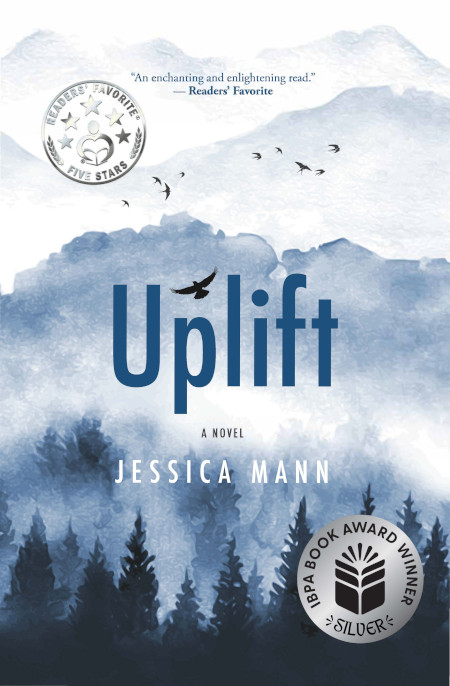Jessica Mann’s novel Uplift (2024) is a work of realistic animal fiction, told entirely from the point of view of wild birds, animals, and an ancient tree. The book has won national awards and been featured in Psychology Today and The Nature Conservancy.
When her high mountain wilderness is threatened by humans, a rebellious young bird must teach others how to work together to save their common home. An inspiring, lyrical coming-of-age story with heart and purpose. For teen through adult readers.
Mary: Hi Jessica. Welcome to Dragonfly! What inspired you to write Uplift?
Jessica: A deep love for nature and animals has a North Star for me and a constant source of joy and inspiration my entire life. So I knew I wanted to try and incorporate that into my writing. But as I looked around, I noticed that most books about nature still had people as narrators and central characters. Why do all stories have to be told from a human point of view, I wondered—there are plenty of other intelligent, sentient beings in the world with stories to tell! My inspiration for the book was to give them a voice.
Mary: What is the message of the book?
Jessica: Uplift is about Columbina, a rebellious young bird born high in a spruce tree in a mountain wilderness. As she comes of age, she begins to question her clan’s traditions and forms bonds with creatures beyond her species. Ultimately, they all must confront the looming threat from encroaching humans.
I intentionally wrote Uplift to be a book of hope and the possibility of change, as an antidote to the ecological despair that so many of us have felt these past years. Because there is so much still here that is beautiful and worth saving! The book is a reminder of all that, a vivid love letter to nature that transports you deep into the wilderness. Readers use phrases like a new outlook, a sense of wonder, eyes opened, inspiring, enlightening, and uplifted to describe how they feel after reading it.
Mary: How did you go about portraying the animal characters?
Jessica: As a naturalist, it was important to me that the animals be as genuine and realistic as possible, so I started by doing a lot of research on their life histories—where they live, what they eat, how long they live, their social lives, and so on. I also needed to understand their physical bodies and senses. For example, can Nutcrackers feel with their feathers? Mate for life? Hold ceremonies for their dead? (Yes on all three.) Can Kingfishers see underwater? (Yup.) Can dragonflies see all the way around their heads? (Not quite.) There were so many questions to be answered to feel like I was doing these creatures justice!
Mary: What was your favorite story growing up?
Jessica: Great question and one I haven’t thought about in a long time, but since you asked… I guess I would have to say Smoky the Cowhorse, the Newbery Medal winner by Will James. I can still remember sitting in my elementary school library in Michigan feeling the thrill of being out on the open plains with that little horse. Which, when I think about it now, is pretty hilarious since the book was written from the point of view of a nonhuman—so I guess my obsession with animal fiction goes back deeper than I even realized!
Mary: Tell us something about your life.
Jessica: When I was a kid I was lucky enough to travel abroad with my family, and we lived in Uganda and in France for several years. The entire experience had a strong influence on me: nothing like seeing other cultures to make you realize there is not just one way to live. Being exposed to poverty and difficult living conditions, too, brought home how privileged and fortunate we westerners are in so many ways. The memories of the great herds of wildebeest on the savanna, being charged by an angry elephant, hearing the roar of lions—these experiences only cemented my love for animals and wild places.
Mary: What’s next for you?
Jessica: The reception for Uplift has already wildly exceeded my expectations—it has won three national indie awards, received many positive reviews, and been featured in national media. So I decided to turn it into a series, The Habitat Trilogy, to ultimately cover all of life on Earth. Book 1 (Uplift) was set in air; Book 2 (Currents, which I am at work on now) will be set in the ocean and told through the eyes of a family of whales; and Book 3 (Terra) will take place on land, possibly with a family of elephants. So, fingers crossed, stay tuned for a planned 2026 release! I love to hear from readers so, if you’re interested, connect with me or sign up on my website for my quarterly newsletter, “Uplifting News.”
Mary: Thank you so much, Jessica. It’s wonderful to see an uplifting story—your vivid love letter to nature.
Jessica Mann is an award-winning writer and naturalist based in Teton Valley, Idaho. She writes realistic animal fiction to let readers “see” through the eyes of wild birds and animals. Weaving together emotion, science, and mythology into engaging stories that entertain and inspire, she hopes to inspire greater understanding and compassion for these creatures. Jessica is co-founder of the Teton Valley chapter of Idaho Master Naturalists, an active and growing network of trained volunteers working toward conservation. Her prior work included a 35-year career in environmental health. She has an MPH from the School of Public Health and a BS from the School for Environment from the University of Michigan. Jessica is donating proceeds from the sale of Uplift to groups dedicated to protecting birds and nature. Visit https://jessicamann.org to learn more.

